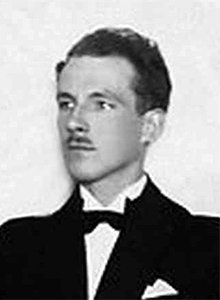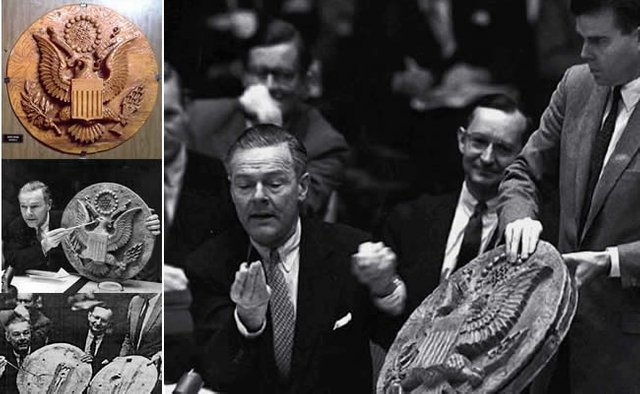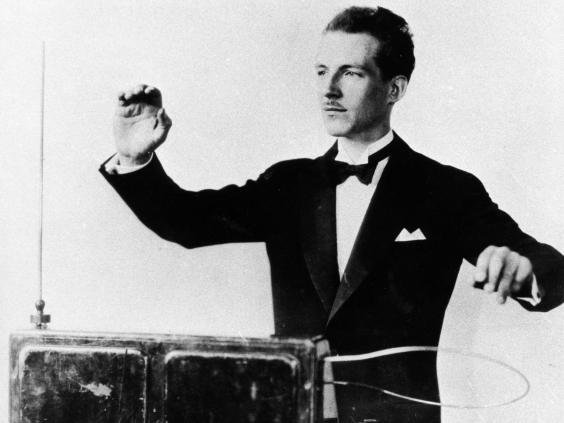Leon Theremin, a spy from the Future
What does electronic music have in common with cape-and dagger activities? It’s hard to answer the question without getting to know this story.

In 1951, a radio officer from the British Embassy in Moscow suddenly heard a strange conversation through an open channel. The conversation turned out to be held inside the US diplomatic mission. This only could be explained by some tapping activity inside the American embassy building. When informed about the issue, the embassy employees had a hard time searching for the tapping device. But in vain.

The State Department sent two of its officers, John W. Ford and Joseph Bezjian, to inspect the building. Finally, they discovered a strange instrument with no wires or power source inside the carved wooden plaque of the Great Seal of the United Stated, given as a gift to the US Ambassador William Averell Harriman on the 4th of August.

The device, later nicknamed The Thing, was so hard to spot because it emitted no radio waves unless it was irradiated remotely. Only many years after The Thing’s creator became known. It was the same man who had stunned the Americans with the first electronic music instrument in the world, gathering large crowds at the famous Carnegie Hall throughout the 1930-s.
His name was Leon Theremin, he came from an old aristocratic family descending from the French Albigense line, and his family bearing was «No more, no less». Natural sciences, engineering and inventing were the predominant passion of his life; while at school he constructed a telescope for himself and often surprised his teachers and classmates with his experiments with optics and electricity. Moreover, Leon was a gifted musician and got his Diploma in music soon after he left school. As a college student, the young man became passionate about the work of the outstanding Russian physicist Abram Ioffe, who studied elementary photoelectric effect and magnetic fields.
When World War I broke out, Leon Theremin was called up to the army as a radio engineer. He oversaw the construction of a radio station in Saratov and later supervised the work of the radio transmitter at Tsarskoye Selo near Saint-Petersburg. During the Civil War which followed the October Revolution of 1917, he was responsible for training radio specialists, sharing the adversities of war with his students. Though, in general, things got tough for the Russian gentry under the Bolsheviks, the most gifted representatives of the former upper class were not forced out of the country or imprisoned if they expressed readiness to cooperate with the Communist government, and Leon was a keen supporter of the Revolution that he believed to be a great kickstarter for technical and social progress.
When the Civil war was over, Leon joined Abram Ioffe’s team and tried himself in many different fields. The invention that brought Theremin to his world fame was made by accident: while adapting the dielectric device by adding circuitry to generate an audio tone, Theremin noticed that the pitch changed when his hand moved around. This discovery laid the foundation to the new musical instrument - «etherovox»/«theremin»/«termenvox» - and gave start to the new era in the music in the first place. The mystic sound it produced bore no resemblance to the sound of any musical instrument known before; at times, it was like a high-pitched voice of a living being. To the viewer, this sound seemed extracted directly from the air.

Leon presented his invention to Vladimir Lenin himself and later described how he taught the Сommunist leader to play theremin by merely moving his hands in the air. With Lenin’s most keen support, the theremin became the symbol of the progress that Communist Russia was bringing to its citizens. And Theremin’s all-Russian concert tour was a brilliant PR campaign to promote the ambitious GOELRO plan - the electrification of the whole country. Under Czarist rule, vast rural territories had been uncovered by electricity grid. People had been lighting their poor houses with splinters, the greater part of rural population was illiterate. The Bolsheviks, aiming to make Russia a strong industrial power, could no more put up with it, and the extraordinary theremin music symbolized the upcoming era of electricity. In cities and villages, the young physicist was greeted like a rock star of our times. And that was just the beginning.
(To be continued)
Sources:
https://www.moogmusic.com/legacy/pulling-music-out-thin-air-interview-leon-theremin
https://books.google.ru/books/about/Theremin.html?id=6DHlQJcMpBQC&redir_esc=y
https://en.wikipedia.org/wiki/The_Thing_(listening_device)
http://www.chaskor.ru/article/lev_termen_protiv_smerti_19355
Very interesting story. I did only know about him as the inventor of the theremin until now.
He did much more than that, but even today we don't know about all his invention. He was into medicine as well, I will mention it further on...
Cool, looking forward to it. Maybe you could also add some sources? That would be great!
It's sad that the book "Soviet Faust" isn't translated in English, but there's also a book by Albert Glinsky - "Theremin. Ether Music and Espionage". I have added some other sources into the post.
Great, thanks a lot!